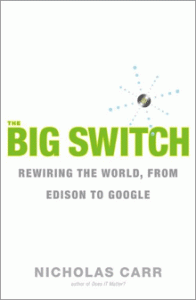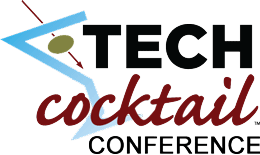Curmudgeonly Looking into the Past to Divine the Future—That Nagging Privacy Issue—Debunking the Elephant
 The Big Switch is a valuable book that reflects what has become Nick Carr’s trademark role, heckling IT and Web enthusiasts, albeit from good seats. Carr seems to relish his role as “the fly in the ointment” of the idealistic IT-enabled world that Web missionaries espouse. Although this book has shortcomings, I recommend it for two reasons. First, Carr makes a convincing and useful argument that the “electrification” of business and society (the Edison part) has valuable lessons for the “computerization” transformation of business and society (the Google part) that is currently unfolding. This parallel provides context to think about some of the disruptions around your business, society and career. Second, Carr raises serious questions about possible privacy implications of computerization. He palpably weighs in on the dark side and seems to want the world to change course from the “googlization of life.” If you haven’t read The Long Tail, I would read these books in proximity because they are very complementary and both quick, important reads. The Big Switch is a valuable book that reflects what has become Nick Carr’s trademark role, heckling IT and Web enthusiasts, albeit from good seats. Carr seems to relish his role as “the fly in the ointment” of the idealistic IT-enabled world that Web missionaries espouse. Although this book has shortcomings, I recommend it for two reasons. First, Carr makes a convincing and useful argument that the “electrification” of business and society (the Edison part) has valuable lessons for the “computerization” transformation of business and society (the Google part) that is currently unfolding. This parallel provides context to think about some of the disruptions around your business, society and career. Second, Carr raises serious questions about possible privacy implications of computerization. He palpably weighs in on the dark side and seems to want the world to change course from the “googlization of life.” If you haven’t read The Long Tail, I would read these books in proximity because they are very complementary and both quick, important reads.
As […]
Web 3.0 and Social Business—2011 Predictions and Recommendations describes a turning point, away from social media to social business. SocialTech Grows Up—Relationship the Foundation of Business Success—Digital Clodhoppers Become Sore Thumbs.
 2011 will mark a turning point in the adoption of digital social technologies because the experimentation phase is drawing to a close, and stakeholder expectations are increasing. Organizations and people will no longer gain attention by executing badly. At the enterprise level, participation will wane in venues and initiatives that have no business strategy, focus, content strategy and commitment. Paying inexperienced people or agencies to “share” snappy content will expose brands as digital clodhoppers and push customers away. Individuals will also have to improve their game and focus on the most relevant people in their networks. Stop sending default invitations on LinkedIn. Proactively support people whom you respect and trust the most. The theme is determining and executing on strategy, focus and commitment. 2011 will mark a turning point in the adoption of digital social technologies because the experimentation phase is drawing to a close, and stakeholder expectations are increasing. Organizations and people will no longer gain attention by executing badly. At the enterprise level, participation will wane in venues and initiatives that have no business strategy, focus, content strategy and commitment. Paying inexperienced people or agencies to “share” snappy content will expose brands as digital clodhoppers and push customers away. Individuals will also have to improve their game and focus on the most relevant people in their networks. Stop sending default invitations on LinkedIn. Proactively support people whom you respect and trust the most. The theme is determining and executing on strategy, focus and commitment.
In 2011, the bar to attract and hold attention will be higher, which will present organizations with a new threat: when participation falls, some executives will conclude that […]
2010 Predictions and recommendations for enterprise social networking and Web 2.0: how executives and enterprises can leverage social business to increase competitiveness. Understand how social networks are contributing to the end of the Industrial Economy: the importance of blogs, Twitter, Facebook, LinkedIn, YouTube, MySpace and focusing on relationships. […]
Dave Taylor of Imperial College London discusses his extensive experience with using virtual worlds to deliver business value.. good practices for Second Life […]
Digital social networks are transforming every field of human endeavor because they change the economics of how people discover, develop and maintain relationships. Therefore, social networks propose a revolution in communication is similar in scope to Ford’s invention of the assembly line for fabrication but executives don’t understand it. This post […]
Knowledge Economy Unfolds via All Things Digital-Social—Wearing Passion and Personality on Your Sleeve
Discerning Web 2.0 from Web 1.0—Ron May Gets Comeuppance as Happy and Successful
 Web 2.0 entrepreneurs, financiers and professional services folk descended on Loyola University Chicago’s Lewis Hall 29 May 2008 for “Tech Conference,” TechCocktail’s first ever day-long educational event. Founders Frank Gruber and Eric Olson served an effervescent yet heady elixir of heart-to-heart war stories, lessons learned and strategies by entrepreneurs, venture capitalists, lawyers, accountants and an executive coach. Web 2.0 entrepreneurs, financiers and professional services folk descended on Loyola University Chicago’s Lewis Hall 29 May 2008 for “Tech Conference,” TechCocktail’s first ever day-long educational event. Founders Frank Gruber and Eric Olson served an effervescent yet heady elixir of heart-to-heart war stories, lessons learned and strategies by entrepreneurs, venture capitalists, lawyers, accountants and an executive coach.
Since attending TechCocktail 1 in July 2006, I have promoted the periodic TechCocktail “meetups” to everyone who will listen as the place to learn about and connect with Web 2.0 players and technology in Chicago (elsewhere now, too). Frank and Eric have created one of the most worthwhile groups and communities in the city and were recognized in the ITA’s Citylights this year. Their first conference was both high value and quintessentially Web 2.0: speakers were open about what had worked and what hadn’t. The program was well balanced, organized and entertaining. There were considerable lessons for […]
Leveraging B2C “Social” Networks for Real Enterprise Advantage—Flashbacks to Web 1.0—People in Bars
 Pan in, circa 1998, and enterprises were beginning to doubt the conventional wisdom that had prevailed during the past three years, namely that “the Internet” was a Silicon Valley fad that would blow over with nary a whimper. It was “for kids,” it didn’t merit adult attention—none of these “businesses” were making money anyway. You can’t be serious, how could a money-losing online bookstore affect GM? It looks silly to read these words today, but that’s only because we know what happened. Here I will suggest that we are on the cusp of a similar shift with Web 2.0 and social networks, I’ll outline an approach you can use to consider your adoption strategy, and I will recommend tactical things you can do right now to leverage LinkedIn, Facebook, Twitter, YouTube, Del.icio.us and others. Pan in, circa 1998, and enterprises were beginning to doubt the conventional wisdom that had prevailed during the past three years, namely that “the Internet” was a Silicon Valley fad that would blow over with nary a whimper. It was “for kids,” it didn’t merit adult attention—none of these “businesses” were making money anyway. You can’t be serious, how could a money-losing online bookstore affect GM? It looks silly to read these words today, but that’s only because we know what happened. Here I will suggest that we are on the cusp of a similar shift with Web 2.0 and social networks, I’ll outline an approach you can use to consider your adoption strategy, and I will recommend tactical things you can do right now to leverage LinkedIn, Facebook, Twitter, YouTube, Del.icio.us and others.
Since 2006, my consulting work has encompassed strategic and tactical sides of Web 2.0 and social networks and, in 2008, I launched a tactically-focused service, the Executive’s Guide to LinkedIn, which helps global enterprises to use LinkedIn for process innovation. This has provided the […]
Geography 3.0, What It Is and What It Means predicts a new synthesis in the Knowledge Economy—fast forward to the past—Plus, the fire
 Noodles are largely driven by intuition and holistic mental doodling, and this one has been simmering a long time*. I believe that there is profound meaning in virtual and literal “mobility,” and I’ll explore its significance in terms geography and human relationships. Geography has always had a profound impact on how humans have lived and the organizations in which we have lived, and when its meaning shifts, our lives are transformed. This is of paramount importance because human relationships are currently transitioning from geography-based to interest-based. Many governments and businesses harbor business rules that assume geography-based relationships, and, unless they appreciate the shift to interest-based relationships, they will experience disruption’s spin cycle. Lose a turn. Don’t pass go ,^) Noodles are largely driven by intuition and holistic mental doodling, and this one has been simmering a long time*. I believe that there is profound meaning in virtual and literal “mobility,” and I’ll explore its significance in terms geography and human relationships. Geography has always had a profound impact on how humans have lived and the organizations in which we have lived, and when its meaning shifts, our lives are transformed. This is of paramount importance because human relationships are currently transitioning from geography-based to interest-based. Many governments and businesses harbor business rules that assume geography-based relationships, and, unless they appreciate the shift to interest-based relationships, they will experience disruption’s spin cycle. Lose a turn. Don’t pass go ,^)
Before exploring how these things will unfold in Part II, let’s review three geographies and four economies here in Part I…
[…]
Bank Panic in Second Life Prompts Battlefield Promotion of Regulators reveals interesting parallels between physical and virtual worlds—it’s real money, after all.

“What? I can’t go to the grocery store! My bank’s automated teller machine refuses to dispense cash, and I’m planning a big cook-out tonight!” What’s an avatar to do?
It turns out that an inworld bank failure this summer cost residents about $750,000 USD and led to a run on Second Life banks, which eventually precipitated intervention by the highest authority available, the virtual world’s creator, Linden Labs. But the root cause may well have been LL’s earlier intervention in the economy by banning gambling on the site.
[…]
Year in Review 2007—Editor’s Choice of the Global Human Capital Journal
 As I reflect on 2007 and create strategy for 2008, several macro-trends come into sharp relief, and I believe that some of them might be helpful to you as you conduct your own planning. As always, I focus on emerging phenomena because they are areas in which disruption and discontinuous change are acting on markets, thereby elevating threats and opportunities. Helping leaders to create strategy to manage the risk of unusual market developments is the focus of my consulting practice. As I reflect on 2007 and create strategy for 2008, several macro-trends come into sharp relief, and I believe that some of them might be helpful to you as you conduct your own planning. As always, I focus on emerging phenomena because they are areas in which disruption and discontinuous change are acting on markets, thereby elevating threats and opportunities. Helping leaders to create strategy to manage the risk of unusual market developments is the focus of my consulting practice.
In 2007 it became clear to me that we were entering a profound social transformation that would produce an unimaginable degree of change. Unlike the technology-precipitated change that I’ve been helping people with since the 1990s, technology is shifting to the background now, and pervasive social change is taking the stage. Look for disruption in all areas affected by how people connect, communicate, purchase and collaborate: business, politics, community and leisure. Moreover, these changes are completely global with all the variations that engenders.
I can’t tell […]
|
|
 The Big Switch is a valuable book that reflects what has become Nick Carr’s trademark role, heckling IT and Web enthusiasts, albeit from good seats. Carr seems to relish his role as “the fly in the ointment” of the idealistic IT-enabled world that Web missionaries espouse. Although this book has shortcomings, I recommend it for two reasons. First, Carr makes a convincing and useful argument that the “electrification” of business and society (the Edison part) has valuable lessons for the “computerization” transformation of business and society (the Google part) that is currently unfolding. This parallel provides context to think about some of the disruptions around your business, society and career. Second, Carr raises serious questions about possible privacy implications of computerization. He palpably weighs in on the dark side and seems to want the world to change course from the “googlization of life.” If you haven’t read The Long Tail, I would read these books in proximity because they are very complementary and both quick, important reads.
The Big Switch is a valuable book that reflects what has become Nick Carr’s trademark role, heckling IT and Web enthusiasts, albeit from good seats. Carr seems to relish his role as “the fly in the ointment” of the idealistic IT-enabled world that Web missionaries espouse. Although this book has shortcomings, I recommend it for two reasons. First, Carr makes a convincing and useful argument that the “electrification” of business and society (the Edison part) has valuable lessons for the “computerization” transformation of business and society (the Google part) that is currently unfolding. This parallel provides context to think about some of the disruptions around your business, society and career. Second, Carr raises serious questions about possible privacy implications of computerization. He palpably weighs in on the dark side and seems to want the world to change course from the “googlization of life.” If you haven’t read The Long Tail, I would read these books in proximity because they are very complementary and both quick, important reads.
 2011 will mark a turning point in the adoption of digital social technologies because the experimentation phase is drawing to a close, and stakeholder expectations are increasing. Organizations and people will no longer gain attention by executing badly. At the enterprise level, participation will wane in venues and initiatives that have no business strategy, focus, content strategy and commitment. Paying inexperienced people or agencies to “share” snappy content will expose brands as digital clodhoppers and push customers away. Individuals will also have to improve their game and focus on the most relevant people in their networks. Stop sending default invitations on LinkedIn. Proactively support people whom you respect and trust the most. The theme is determining and executing on strategy, focus and commitment.
2011 will mark a turning point in the adoption of digital social technologies because the experimentation phase is drawing to a close, and stakeholder expectations are increasing. Organizations and people will no longer gain attention by executing badly. At the enterprise level, participation will wane in venues and initiatives that have no business strategy, focus, content strategy and commitment. Paying inexperienced people or agencies to “share” snappy content will expose brands as digital clodhoppers and push customers away. Individuals will also have to improve their game and focus on the most relevant people in their networks. Stop sending default invitations on LinkedIn. Proactively support people whom you respect and trust the most. The theme is determining and executing on strategy, focus and commitment. Web 2.0 entrepreneurs, financiers and professional services folk descended on Loyola University Chicago’s Lewis Hall 29 May 2008 for “Tech Conference,” TechCocktail’s first ever day-long educational event. Founders Frank Gruber and Eric Olson served an effervescent yet heady elixir of heart-to-heart war stories, lessons learned and strategies by entrepreneurs, venture capitalists, lawyers, accountants and an executive coach.
Web 2.0 entrepreneurs, financiers and professional services folk descended on Loyola University Chicago’s Lewis Hall 29 May 2008 for “Tech Conference,” TechCocktail’s first ever day-long educational event. Founders Frank Gruber and Eric Olson served an effervescent yet heady elixir of heart-to-heart war stories, lessons learned and strategies by entrepreneurs, venture capitalists, lawyers, accountants and an executive coach. Pan in, circa 1998, and enterprises were beginning to doubt the conventional wisdom that had prevailed during the past three years, namely that “the Internet” was a Silicon Valley fad that would blow over with nary a whimper. It was “for kids,” it didn’t merit adult attention—none of these “businesses” were making money anyway. You can’t be serious, how could a money-losing online bookstore affect GM? It looks silly to read these words today, but that’s only because we know what happened. Here I will suggest that we are on the cusp of a similar shift with Web 2.0 and social networks, I’ll outline an approach you can use to consider your adoption strategy, and I will recommend tactical things you can do right now to leverage LinkedIn, Facebook, Twitter, YouTube, Del.icio.us and others.
Pan in, circa 1998, and enterprises were beginning to doubt the conventional wisdom that had prevailed during the past three years, namely that “the Internet” was a Silicon Valley fad that would blow over with nary a whimper. It was “for kids,” it didn’t merit adult attention—none of these “businesses” were making money anyway. You can’t be serious, how could a money-losing online bookstore affect GM? It looks silly to read these words today, but that’s only because we know what happened. Here I will suggest that we are on the cusp of a similar shift with Web 2.0 and social networks, I’ll outline an approach you can use to consider your adoption strategy, and I will recommend tactical things you can do right now to leverage LinkedIn, Facebook, Twitter, YouTube, Del.icio.us and others. Noodles are largely driven by intuition and holistic mental doodling, and this one has been simmering a long time*. I believe that there is profound meaning in virtual and literal “mobility,” and I’ll explore its significance in terms geography and human relationships. Geography has always had a profound impact on how humans have lived and the organizations in which we have lived, and when its meaning shifts, our lives are transformed. This is of paramount importance because human relationships are currently transitioning from geography-based to interest-based. Many governments and businesses harbor business rules that assume geography-based relationships, and, unless they appreciate the shift to interest-based relationships, they will experience disruption’s spin cycle. Lose a turn. Don’t pass go ,^)
Noodles are largely driven by intuition and holistic mental doodling, and this one has been simmering a long time*. I believe that there is profound meaning in virtual and literal “mobility,” and I’ll explore its significance in terms geography and human relationships. Geography has always had a profound impact on how humans have lived and the organizations in which we have lived, and when its meaning shifts, our lives are transformed. This is of paramount importance because human relationships are currently transitioning from geography-based to interest-based. Many governments and businesses harbor business rules that assume geography-based relationships, and, unless they appreciate the shift to interest-based relationships, they will experience disruption’s spin cycle. Lose a turn. Don’t pass go ,^) As I reflect on 2007 and create strategy for 2008, several macro-trends come into sharp relief, and I believe that some of them might be helpful to you as you conduct your own planning. As always, I focus on emerging phenomena because they are areas in which disruption and discontinuous change are acting on markets, thereby elevating threats and opportunities. Helping leaders to create strategy to manage the risk of unusual market developments is the focus of my consulting practice.
As I reflect on 2007 and create strategy for 2008, several macro-trends come into sharp relief, and I believe that some of them might be helpful to you as you conduct your own planning. As always, I focus on emerging phenomena because they are areas in which disruption and discontinuous change are acting on markets, thereby elevating threats and opportunities. Helping leaders to create strategy to manage the risk of unusual market developments is the focus of my consulting practice.